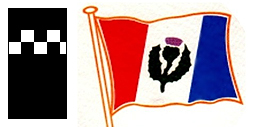Burns, Philp & Company Limited
 As a successor to trading activity commenced in Queensland twenty years earlier, this company (“B.P.”s) was incorporated in Sydney in 1883. It was destined to become a pioneer and ambassador for Australia in much of the South-West Pacific area as well as nationally, for more than a century a multi-national conglomerate whose ship-owning activities date from January 1896. During the Great War its Matunga, en route from Sydney to Rabaul, was captured on 6 August 1917 by the German raiding ship Wolf, which sank it, carrying its crew and passengers into captivity in Europe until war’s end.
As a successor to trading activity commenced in Queensland twenty years earlier, this company (“B.P.”s) was incorporated in Sydney in 1883. It was destined to become a pioneer and ambassador for Australia in much of the South-West Pacific area as well as nationally, for more than a century a multi-national conglomerate whose ship-owning activities date from January 1896. During the Great War its Matunga, en route from Sydney to Rabaul, was captured on 6 August 1917 by the German raiding ship Wolf, which sank it, carrying its crew and passengers into captivity in Europe until war’s end.
By 1939, Burns Philp mariners had accumulated a vast, detailed knowledge of the channels, reefs and shoals of the South West Pacific islands. This knowledge, together with their pilotage and guidance skills proved invaluable (several being decorated) as the “island-hopping” campaigns of the Allies repulsed the Japanese incursions.
As the Second World War commenced the company had, as well as many smaller inter-island vessels, ten ships in its mainline fleet:
Ship |
Built |
Gross Tons |
In Service |
| Montoro | 1912 | 4057 | 1912-1955 |
| Morinda | 1913 | 1917 | 1913-1953 |
| Marella | 1917 | 7475 | 1920-1948 |
| Mangola | 1920 | 3350 | 1925-1957 |
| Macdhui | 1930 | 4561 | 1931-1942 |
| Malaita | 1933 | 3310 | 1933-1965 |
| Neptuna | 1924 | 5952 | 1935-1942 |
| Merkur | 1924 | 5952 | 1935-1953 |
| Bulolo | 1938 | 6267 | 1938-1968 |
| Tulagi | 1939 | 2281 | 1939-1944 |
As well, Burnside (b.1940.gt. 5659. s.1940-1964) was under construction in the United Kingdom, while the inter-island Muliama (b.1937, gt.689, s.1937-1957) was drawn into Australian service. Burnside was returned to the company by the British Ministry of War Transport in 1946.
Bulolo was requisitioned 22 September 1939 for Royal Navy war service as an Armed Merchant Cruiser, Burnside on completion was taken over by the British Ministry of War Transport and Merkur was taken over by the Royal Australian Navy on 12 December 1941 as a Victualling Stores Issue Ship, serving in this role until June 1948. Montoro had significant involvement in trooping duties between southern Australian ports, the country’s north and Papua New Guinea. Neptuna was bombed and sunk in Darwin on 19 February 1942 with forty-five killed, Macdhui was bombed and sunk in Port Moresby on 18 June 1942 with ten killed, Malaita, taken over by the Royal Australian Navy in March 1942, was torpedoed by Japanese submarine RO.33 off Port Moresby harbour on 29 August 1942 and Tulagi was sunk in the Indian Ocean on 27 March 1944 with the loss of forty-seven lives.
Notable among the numerous inter-island vessels lost, three of the larger ones, Lakatoi, Matafele and Mamutu fell victim to enemy action: Lakatoi , (b.1938 gt.341 svce.1938-1943) was presumed sunk, with the loss of twenty-three personnel, Matafele (b.1938 gt.355 svce.1938-1942), requisitioned by the Royal Australian Navy in 1943, was presumed sunk, the cause unknown, between Townsville and Milne Bay, its total loss including seventeen crew and twenty naval ratings, and Mamutu (b.1938 gt.300 svce.1938-1942) was sunk by submarine RO33 in the Torres Strait, with twenty-three crew and 119 passengers killed, one person surviving.